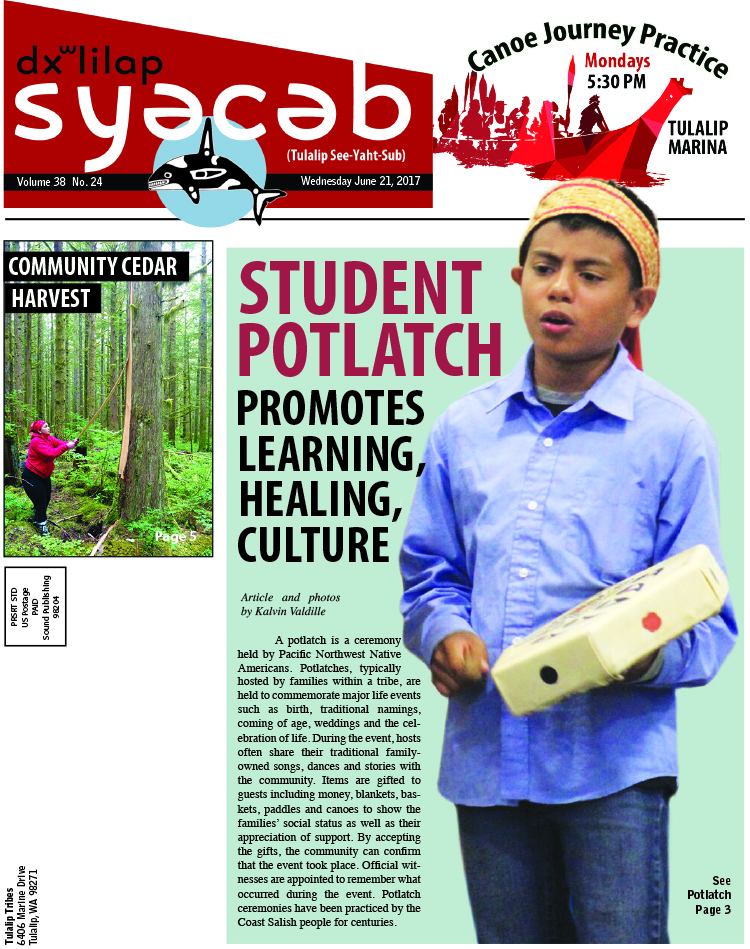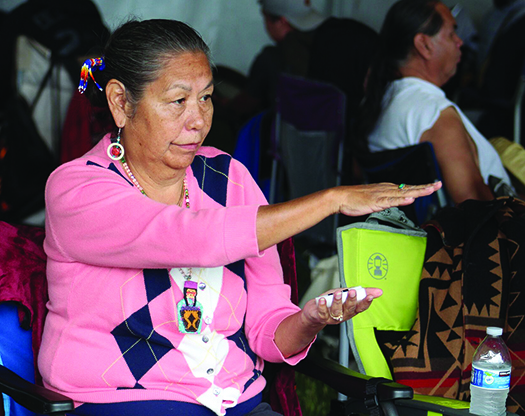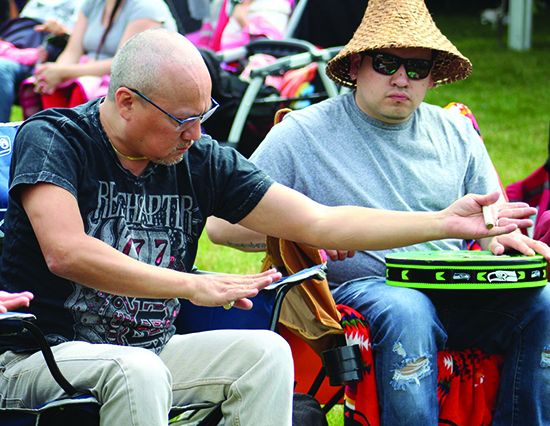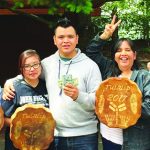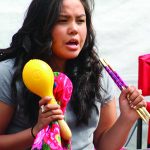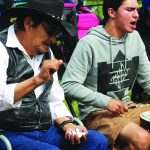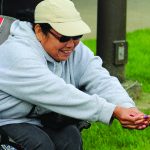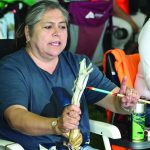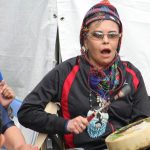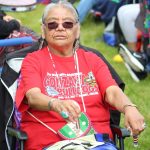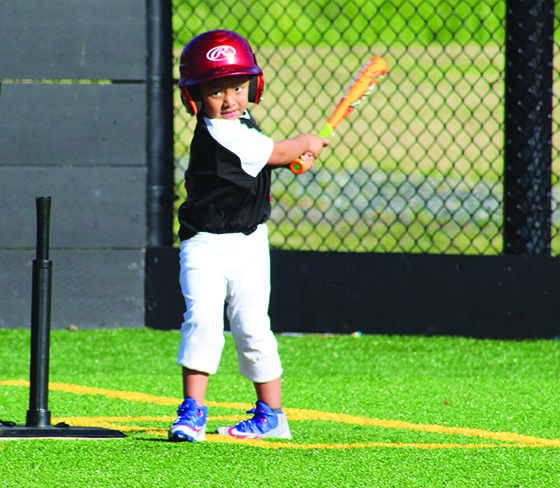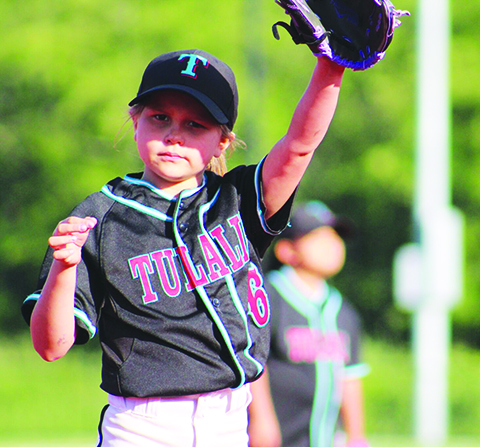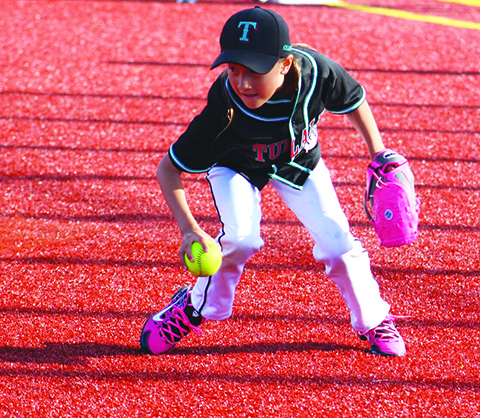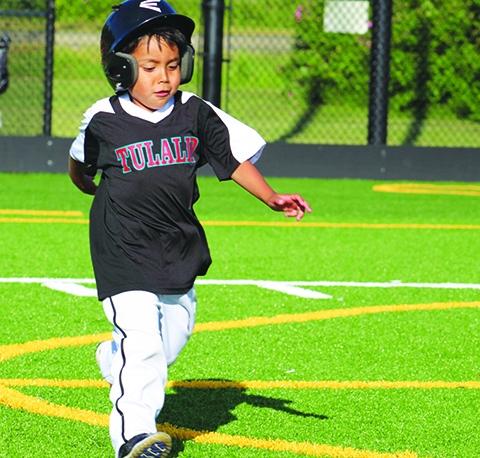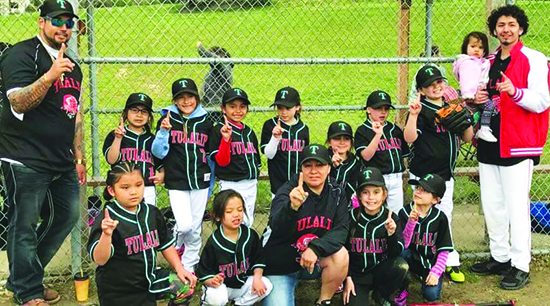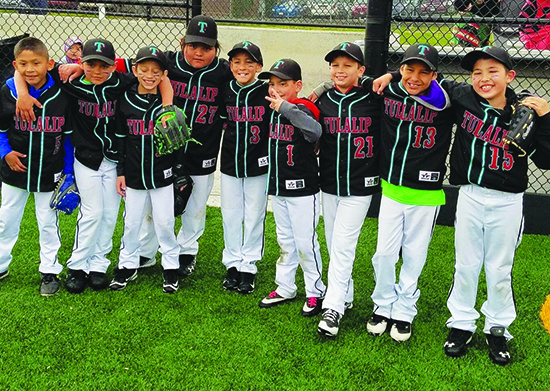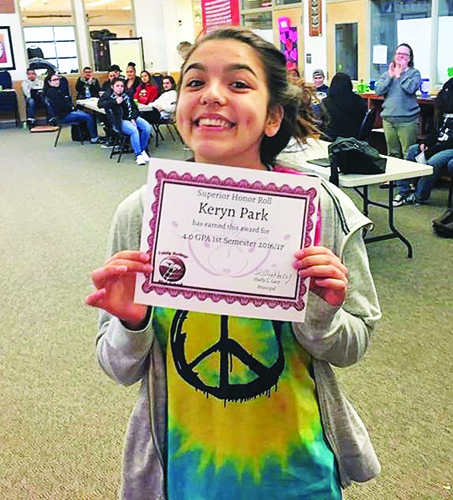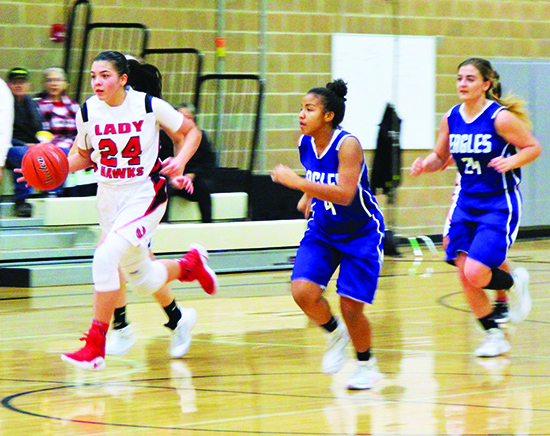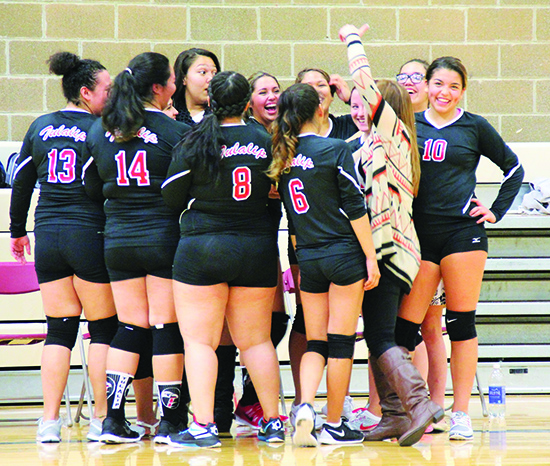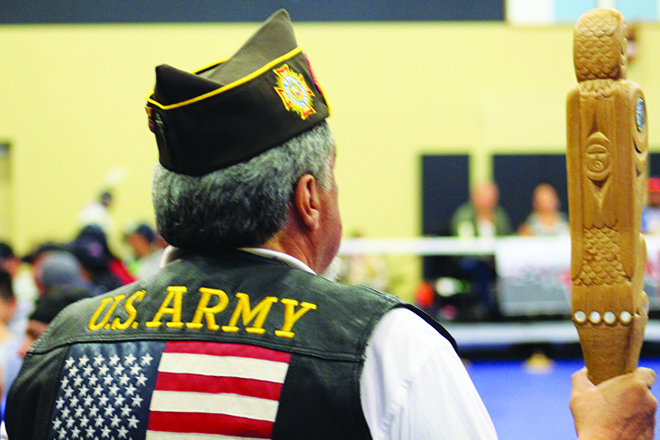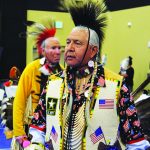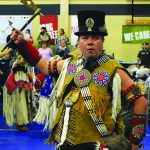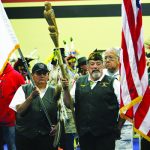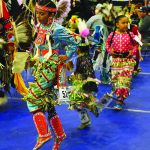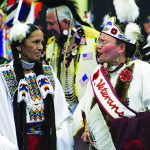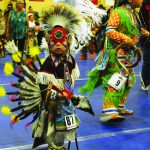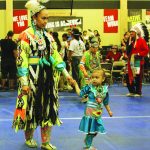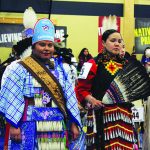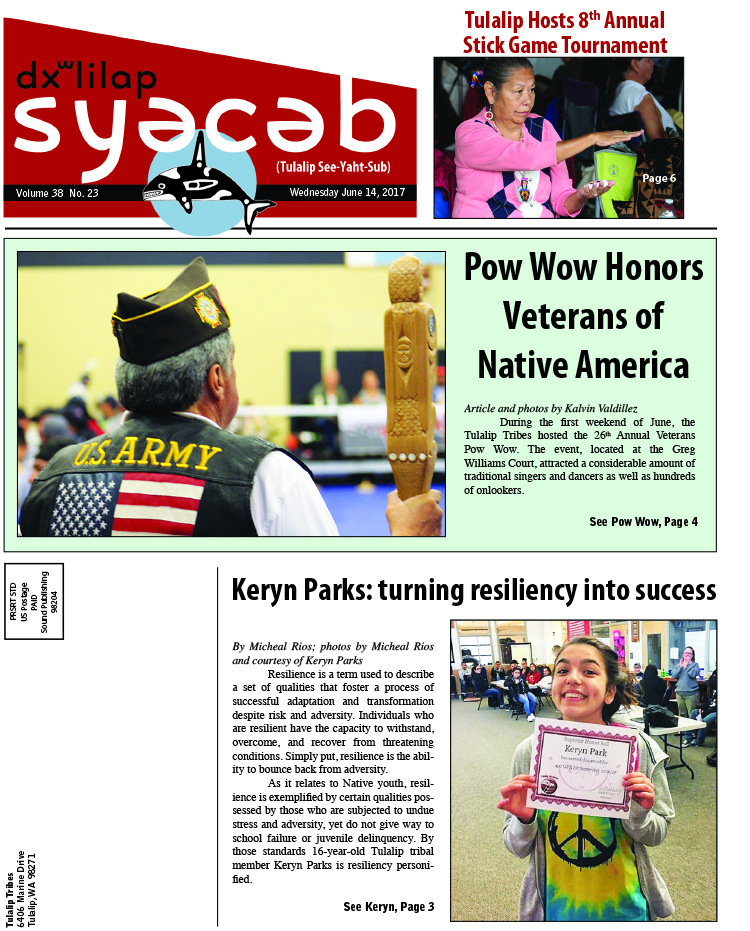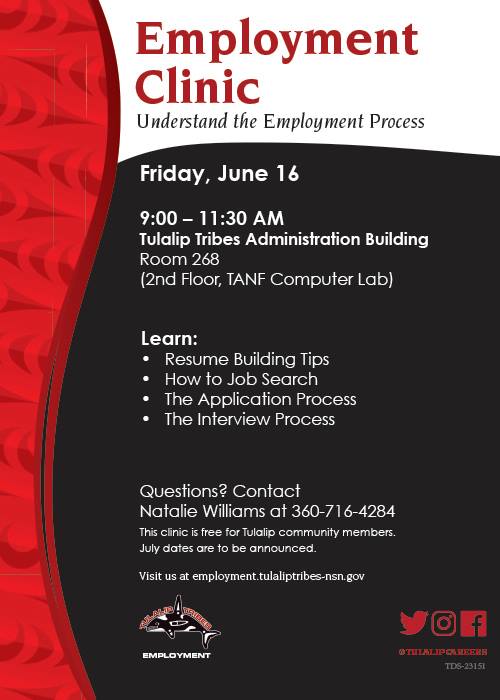Author: Kim Kalliber
June 21, 2017 syəcəb
Please use the following link to download the June 21, 2017 issue of the syəcəb: https://www.dropbox.com/s/cf4wohmermjwzwy/June%2021%202017%20sy%C9%99c%C9%99b.pdf?dl=0
Tulalip Hosts 8th Annual Stick Game Tournament
By Kalvin Valdillez, Tulalip News
Slahal is a well-known gambling game played amongst Native American tribes of the Pacific Northwest coast. Known by a variety of names such as hand game, bone game and stick game, Slahal has been used since time immemorial by Native American ancestors to settle a multitude of disputes including the rights to hunting and fishing territories. In many Northwest Native American communities it is believed that Slahal was gifted from the animals as a means to prevent war and unite the Coast Salish tribes.
Each year, the Tulalip Tribes hosts a weekend-long stick-game tournament at the Tulalip Amphitheater, located north of the Tulalip Resort and Casino. Coast Salish families’ journey, some from as far British Columbia, to join in on the festivities and for the opportunity to win cash prizes.
Gameplay requires two opposing teams, consisting of three to five players, to face each other. Salhal game pieces include two pairs of bones, one pair decorated with beaded stripes, as well as a set of sticks, used to keep score. The bones are separated amongst the players and the opposing team has to correctly guess where the beaded bones are. Traditional songs are performed while the team discreetly shuffles the game pieces between players, as a means of distraction.
This year, the 8th Annual Tulalip Tribes Stick Game Tournament was held Friday June 2 through Sunday June 4 and featured a total weekend payout of $63,000. Over one hundred and seventeen teams competed for a chance to win the grand prize of $50,000. Stick games promote positive lifestyle choices as the event is drug and alcohol-free. The tournament is open to all ages, providing the opportunity for multi-generational families to learn, share and enjoy the traditional game of Slahal.
Play Ball! Tulalip Community Steps Up to the Plate For Future Generations
By Kalvin Valdillez, Tulalip News. Photos by Kalvin Valdillez and courtesy of Josh Fryberg
“I remember playing in a championship baseball game on this field. We were playing against Lummi and the game went into extra innings. We end up winning by one. When you’re young, I was about thirteen or fourteen, that feeling is awesome. Baseball was strong back then,” recalled Josh Fryberg about the importance of baseball to the community. Josh serves as Vice President and Softball Coach for the newly established Tulalip Little League program. “We want to continue to bring our youth and our community together in the best way possible. If it’s through sports, that’s what it is. Now that this [Little League program] is going, it’s going to create a strong baseball, softball and t-ball program for the future generations of Tulalip.”
The Tulalip Little League recently finished their first season, which was filled with smiles and cheers from the Tulalip community during both home and away games. Parents, grandparents, aunts and uncles were treated to a beautiful spring as they enjoyed watching the young players learn about the fundamentals of baseball.
With over sixty kids in participation this year, the Little League is off to a great start and will only continue to grow. Five teams proudly wore the trendy Tulalip uniforms this season and in commemoration of a great season, the kids were able to keep their uniforms. The teams consist of two t-ball teams, a girls’ softball rookie team, a boys’ hardball rookie team and a Farm AA boys’ hardball team. The League plans to offer new teams next season, including a Challenger team for children with special needs.
“What we’ve done is historical. It hasn’t been done in the whole state of Washington. There’s maybe two other Native American little leagues [in the country],” explained Tulalip Little League President, Marlin Fryberg Jr.
Marlin was contacted by Toby Briggs, then President of the Marysville Little League, and asked if there was any interest in bringing a little league to Tulalip. Marlin capitalized on the opportunity to bring Little League to Tulalip to benefit the community, as the program has been highly desired by parents, coaches and tribal leaders for a long period of time.
“The mentors I had growing up always dreamed of a little league. They’ve always wanted that for our kids,” said Marlin. “Don [“Penoke”] Hatch, Hank Williams, those folks coached little league back in their day and they were told they had to separate the Native American kids, they couldn’t have them on one team. So they had four teams with Native kids on each team. Hank had a team, Penoke had a team and the late Bob Moses had a team. Now here we are today. These kids are going to look back in twenty to thirty years and say, woah we were the first ones ever to play in the Tulalip Little League.”
The Little League is sponsored by Play It Again Sports in Marysville, The Tulalip Police Department, The Tulalip Tribes and Marlin, who was the initial sponsor, donating his savings to the program. The Tulalip Little League Board consists of Marlin and Josh along with Malorie Simpson, Mytyl Hernandez, Dale Sanchey, Ray Sheldon Jr. and Shawn Sanchey.
“Little league is creating lifetime relationships for the kids,” exclaimed Shawn, who is also a coach for the softball team. “After every game, my girls are always asking their parents ‘can we go to her [teammate’s] house? Can we go to her house?’ It’s pretty awesome. When we play uptown teams, they know them too, ‘I know her she goes to my school’. It’s just so awesome to see the relationships they’re creating just from playing softball or baseball. It’ll stick with them forever.”
Due to the program’s success, other tribal nations are now looking into how to begin little leagues within their districts. Lummi reached out to Tulalip in hopes for guidance during the strenuous process as well as a request for a tribal match in the near future. The Little League coaches and board members are all volunteers who share the same goal of bringing joy and excitement to the community through America’s favorite past time.
“We love to work with the youth of the community and benefit our youth as much as possible. To be a part of coaching these girls, seeing them from their first practice up until their last game, is amazing. We’re so proud of them because they came a long way,” states Josh.
Beginning next season, any youth who wishes to play softball, t-ball or baseball and lives within the Tulalip boundaries will be able to suit up for Tulalip and throw on the popular T embroidered cap. Children between the ages of four and six can participate in t-ball, ages seven and eight can play for the softball and hardball rookie teams, and boys between the ages of eight and nine are able to compete on the Farm AA team.
“We’ve sparked something now,” states Marlin. “For example, on my team, of the eight and nine year olds, there are only three boys who normally went to town to play ball – out of twelve. That’s nine new kids introduced to baseball from our rez. So it’s brand new to a lot of them and they love it.
“I got to watch my dad play here when I was a kid. This whole parking lot was jammed packed, cars were parked up the hill. That’s how important baseball was to our people back then,” Marlin continued. “Growing up watching that, I became a baseball player. I played on the local teams in town, but not only that, baseball helped me stay out of trouble. It helped me stay focused on positive stuff and that’s why we’re doing this for our kids.”
Keryn Parks: Turning Resiliency Into Success
By Micheal Rios, Tulalip News. Photos by Micheal Rios and courtesy of Keryn Parks
Resilience is a term used to describe a set of qualities that foster a process of successful adaptation and transformation despite risk and adversity. Individuals who are resilient have the capacity to withstand, overcome, and recover from threatening conditions. Simply put, resilience is the ability to bounce back from adversity.
As it relates to Native youth, resilience is exemplified by certain qualities possessed by those who are subjected to undue stress and adversity, yet do not give way to school failure or juvenile delinquency. By those standards 16-year-old Tulalip tribal member Keryn Parks is resiliency personified.
The Tulalip Heritage High School junior has experienced things many couldn’t even begin to comprehend, but she didn’t surrender to the adversity. Instead, she conquered it with success.
“With everything that’s happened over the last few years, I just feel way more comfortable in a smaller setting. That’s why I loved Heritage from the first day I transferred during my sophomore year,” says Keryn on her changing of high schools. A former student at Marysville Pilchuck, she first transferred to Lakewood before finding her academic home at Heritage. “I feel way more comfortable in a setting where I know every single person in the room. It’s a friendlier setting that’s both family and culture oriented.”
The change of scenery not only provided Keryn with a much more comfortable learning environment, but it also gave her the opportunity to engage with her cultural roots, excel in the classroom as a student, and flourish on the hardwood as an athlete.
At Heritage, she received traditional teachings like fundamental beadwork from Bubba Fryberg and learning some of the ancestral language of her people under the guidance of Lushootseed language teacher Michelle Myles.
“I’ve learned that I really enjoy beadwork. It’s something I’ve gotten good with and look forward to getting better and learning new techniques. I actually love doing it,” admits Keryn. “Lushootseed was really cool to learn and hear about, especially from Michelle because she’s such an awesome teacher. Hearing her tell us the importance of passing our language down to younger generations so it doesn’t vanish motivated me to learn more.”
Keryn also seized the opportunity to take classes at Marysville’s Arts & Technology High School to bolster her student profile for future college applications. Though the course load was challenging at times, she excelled as a student of both Heritage and Arts & Tech. Using the student tracker application Skyward, Keryn was able to stay on top of all her assignments from both schools to ensure she remained ahead of the curve.
“She’s one of our star students. Her dedication to getting her classwork done and commitment to helping her classmates definitely stands out,” beams Principal Shelly Lacy. “For example, when she sees students in her class who might be having trouble with an assignment she’s always willing to help them. She has such a warm smile and friendly demeanor, so her classmates are open to her assistance. Also, her attendance is great. She’s always here at school and attends all her classes.”
Keryn’s commitment to her education yielded amazing results. In fact, she was recognized for being the only Heritage student with a 4.0 GPA at the end of the 1st semester grading term.
Excelling in academics and athletics can be a daunting task for most, but Keryn found a way to successfully balance the two. Her success in the classroom was also being echoed with athletic achievement. During this past volleyball and basketball seasons she grew into her team’s go-to playmaker. She admits that basketball is her true passion and volleyball was more for fun, yet she reluctantly accepted a leadership role in both.
“She was chosen as a team leader by [her teammates] on and off the court. It took her time to adjust to that role because she didn’t want it at first,” points out Tina Brown, Athletic Director and volleyball coach at Heritage. “It was obvious to us that Keryn’s energy was contagious. When she was in the zone and encouraging her teammates, the whole team’s play would go to a new level. Eventually, she embraced the leadership role and accepted the responsibility to encourage her teammates at the right moments to keep the momentum going. The whole team benefited because of it.”
With Keryn embracing the leadership role, the Lady Hawks volleyball team found unprecedented success. They started off the year (5-0) and made their first ever appearance in the Tri-District Tournament. The Lady Hawks’ success carried over to the basketball season, where Keryn continued to develop as a key playmaker and clutch shot maker. She averaged career highs in nearly every statistical category, while shining in the biggest moments. The team finished with an astonishing (20-6) record including a deep postseason run that ended at Regionals. Recognizing her efforts, Keryn was named to the All-League 1st Team.
The end of basketball season marked the end of the athletic year for Heritage sports. Refocusing all her efforts towards her education, Keryn understands the significance of making the most out of opportunity while still in high school. For her upcoming senior year she intends to enroll in Running Start, a program that allows high school students to take college courses at community colleges. She’ll be earning both high school and college credit for courses taken at Everett Community College.

“I’m more excited than anything. I know it’s going to be challenging and a lot of hard work, but I’m ready for it,” says Keryn a few days after testing into the Running Start program. “I want to make the most out of my senior year by earning college credits. It’ll be really beneficial in the long run. Educationally, I want something more for myself and I hope to show my friends and family what’s possible.”
Of Keryn’s decision to do Running Start during her senior year Principal Lacy adds, “I’m really excited for her. Our goal is to get our students to see what they are capable of and to promote the pathways to college the best we can. The first year of college is always the hardest, there’s so much the students have to adjust to, but through Running Start we get to support them through the process. It’s been wonderful to witness Keryn grow into the person she is. I’m confident that with her dedication she’ll succeed with Running Start.”
Continuing to raise the bar with her education and succeeding at every step helps to change a culture and breaks the stereotypes of Native youth in the academic realm. The stats show that overwhelmingly Native students have difficulty succeeding at college. However, as with basketball in the biggest moments, Keryn has a knack for delivering in the clutch. And thus far, her ability to turn adversity into success through sheer force of will is what makes her so unique.
“I’m proud to be Native American, I’m proud to be Tulalip. In everything that I do and achieve I’m representing my family. Parks, Fryberg, Gobin, and Joseph, all those family names I represent. That’s the weight I hold on my back, that’s who I am,” proclaims Keryn. “While growing up my dad would tell me, ‘Don’t drag our name through the mud, Keryn.’ Now that I’m older I understand what he was getting at. Holding myself accountable, being successful, and focusing on what’s best for me is totally within my control. When people see me doing well and achieving, I want them to think of my parents and grandparents because they are the support system that makes me who I am.”
Lastly, to her peers and fellow Tulalip community members Keryn has this advice, “Know your worth. Know how much your success helps everyone around you. If you’re bettering yourself, then you’re bettering your siblings and little cousins. In this community, you are always going to be a role model know matter what. There are people looking up to you and you don’t even know it. So try to set the best example you can and be that positive role model for the younger ones because it matters to them. It matters to us all.”
Pow Wow Honors Veterans of Native America
By Kalvin Valdillez, Tulalip News
During the first weekend of June, the Tulalip Tribes hosted the 26th Annual Veterans Pow Wow. The event, located at the Greg Williams Court, attracted a considerable amount of traditional singers and dancers as well as hundreds of onlookers.
Draped in traditional and vibrant regalia, the dancers took to the floor to celebrate Native American culture, while over fifteen drum circles provided the beats throughout the weekend. The bleachers of the gym were overflowing as attendees witnessed various tribal members gather, from across the nation, to honor the Veterans of Native America.
Master of Ceremonies, Vince Beyl, worked alongside Arena Director, Anthony Bluehorse, during the drug and alcohol-free event. Numerous vendors were stationed outside of the gym, selling an array of goods including art, clothing, jewelry, beaded regalia, Pendleton blankets and traditional foods such as frybread and Indian tacos.
Enrollment Adoption Discussion
Canoe Journey Practice, Mondays at Tulalip Marina
June 14, 2017 syəcəb
Please use the following link to download the June 14, 2017 issue of the syəcəb: https://www.dropbox.com/s/w64septocz3t0qw/June%2014%202017%20sy%C9%99c%C9%99b.pdf?dl=0

